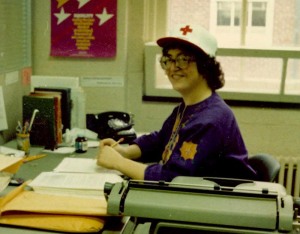When I applied for my first editing job, I barely knew what an editor was. Editing was what I did to my own writing and what I did, as a clerical worker, to my various bosses’ memos, letters, and reports.

Historic photo of me, ca. 1980, in my editorial cubicle, American Red Cross publications office, Alexandria, Va.
Once I was officially an editor, I learned that what editors did was not the same as what writers did.
All unwitting, I’d developed serious editorial skills because I thought they were skills that any writer had to have. This was a lucky break for me because in the 35 years since, I’ve mostly supported myself as an editor.
“Even a great writer needs a good editor. A good writer needs a great editor.” This adage circulates in various forms in the publishing world. In principle I agree. In real life, though, good editing isn’t all that easy to find or to recognize, and when you do find it, it’s not cheap. Editing is time-consuming. It can’t be automated or mass-produced. Editors get paid considerably less per hour than mechanics, plumbers, accountants, or lawyers — where I live, house cleaning pays better than editing — but for book-length manuscripts the hours add up.
Whatever money you spend on good editing is money well spent. (It’s not just the editor in me that says that.) Likewise, the time you spend learning to edit your own work is time well spent. When you get to the point where you can’t go any further, and definitely when you’re thinking about either self-publishing or submitting your manuscript for publication, that’s the time to hire a pro.
So, you say, how do I learn to edit my own work?
I’ve got some ideas. I bet you do too. We’ll be talking a lot about this in Write Through It.